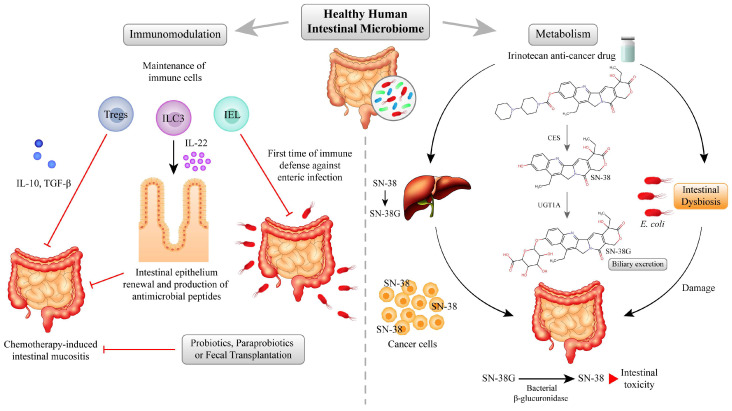Figure 3.
The interplay between microbiome and chemotherapy toxicity on the intestine. Changes in the human intestinal microbiome can influence the development of intestinal mucositis and the overall efficacy and side effects of chemotherapy. The two main mechanisms involved include (1) the modulation of the immune response and (2) alteration in the metabolism of the chemotherapy drug. The intestinal microbiome influences immune responses by interacting with gut-associated lymphoid tissue (GALT), critical for maintaining intestinal homeostasis. A healthy microbiota affects the immune system, favoring homeostasis. It maintains an anti-inflammatory microenvironment, rich in regulatory T cells (Tregs), to tolerate commensals. A healthy microbiota also generates antimicrobials to control pathogenic microorganisms by modulating the functions of intraepithelial lymphocytes (IEL), innate type 3 lymphoid cells (ILC3), and other immune cells within the mucosal layer. Tregs can prevent the development of intestinal mucositis by controlling inflammation. IL-22, produced by ILC3, assists in epithelial renewal and plays a crucial role in maintaining the integrity of the intestinal barrier, which helps control bacterial translocation and support IEL functions. Dysbiosis can affect intestinal immune homeostasis, increasing susceptibility to infections and inflammation, which can be restored with probiotics, paraprobiotics, or fecal transplantation. Fecal transplantation has shown potential to restore a balanced microbiome and mitigate chemotherapy-induced toxicity. Irinotecan is an anticancer drug metabolized in the liver to an active metabolite, SN-38. The conversion of irinotecan to SN-38 by carboxylesterase (CES) is crucial for its therapeutic efficacy. However, the subsequent metabolism of SN-38 by UDP glucuronosyltransferase family 1 member A1 (UGT1A1) can significantly impact its toxicity due to enterohepatic drug circulation. Changes in the intestinal microbiota, including the presence of specific bacterial species such as Escherichia coli, can favor the production of intestinal beta-glucuronidases and deconjugation of the irinotecan metabolite, SN-38G, resulting in increased levels of the active metabolite, SN-38, in the intestine and thereby enhancing toxicity. Chemical descriptors’ canonical SMILES were obtained from https://pubchem.ncbi.nlm.nih.gov/ (accessed on 28 May 2024) under the following PubChem identifiers: Irinotecan (60838); SN-38 (104842), and SN-38G (443154). Subsequently, 2D compound structures were generated with the Chemical Sketch Tool, available at https://www.rcsb.org/chemical-sketch (accessed on 28 May 2024) [115].

